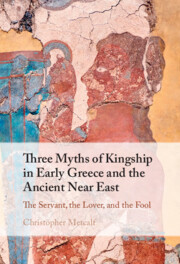 Three Myths of Kingship in Early Greece and the Ancient Near East
Three Myths of Kingship in Early Greece and the Ancient Near East Published online by Cambridge University Press: 19 December 2024
This chapter identifies a well-attested but so far unrecognised story-pattern that was used to explain how an individual of non-royal lineage rose to power from obscure origins: the Myth of the Servant. The myth is first documented in connection with the early Mesopotamian king Sargon of Akkad, the founder of the Old Akkadian dynasty in the third millennium BC. In later periods the story-pattern was applied to other rulers who seemingly emerged from nowhere and created influential new royal dynasties: these include king David of Israel and Judah (according to the Hebrew Bible), and Gyges of Lydia, Cyrus of Persia and Semiramis of Assyria (according to Greek historians). In some parts of the ancient Near East the Myth of the Servant was also used to explain the early history of divine kingship among the gods.
To save this book to your Kindle, first ensure [email protected] is added to your Approved Personal Document E-mail List under your Personal Document Settings on the Manage Your Content and Devices page of your Amazon account. Then enter the ‘name’ part of your Kindle email address below. Find out more about saving to your Kindle.
Note you can select to save to either the @free.kindle.com or @kindle.com variations. ‘@free.kindle.com’ emails are free but can only be saved to your device when it is connected to wi-fi. ‘@kindle.com’ emails can be delivered even when you are not connected to wi-fi, but note that service fees apply.
Find out more about the Kindle Personal Document Service.
To save content items to your account, please confirm that you agree to abide by our usage policies. If this is the first time you use this feature, you will be asked to authorise Cambridge Core to connect with your account. Find out more about saving content to Dropbox.
To save content items to your account, please confirm that you agree to abide by our usage policies. If this is the first time you use this feature, you will be asked to authorise Cambridge Core to connect with your account. Find out more about saving content to Google Drive.